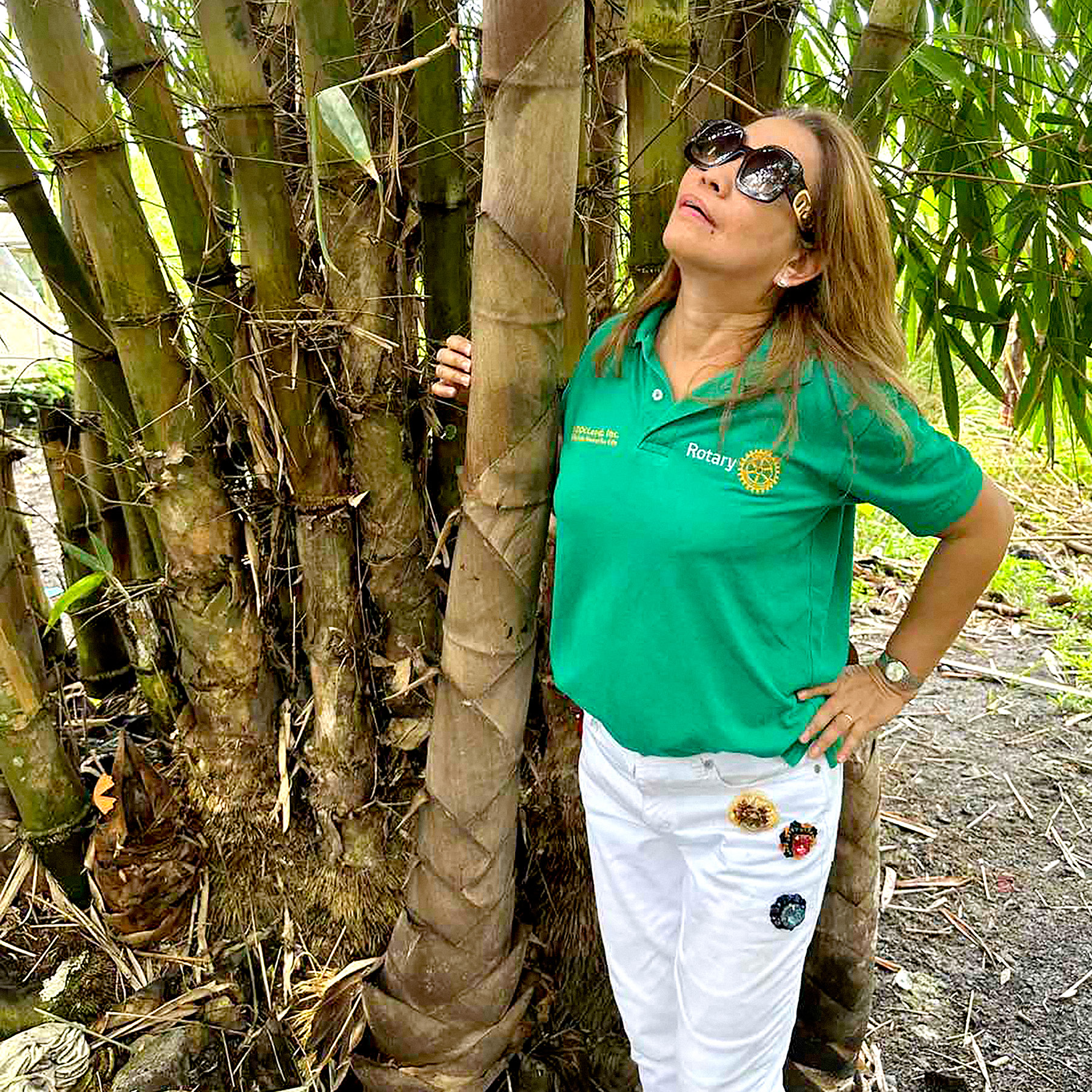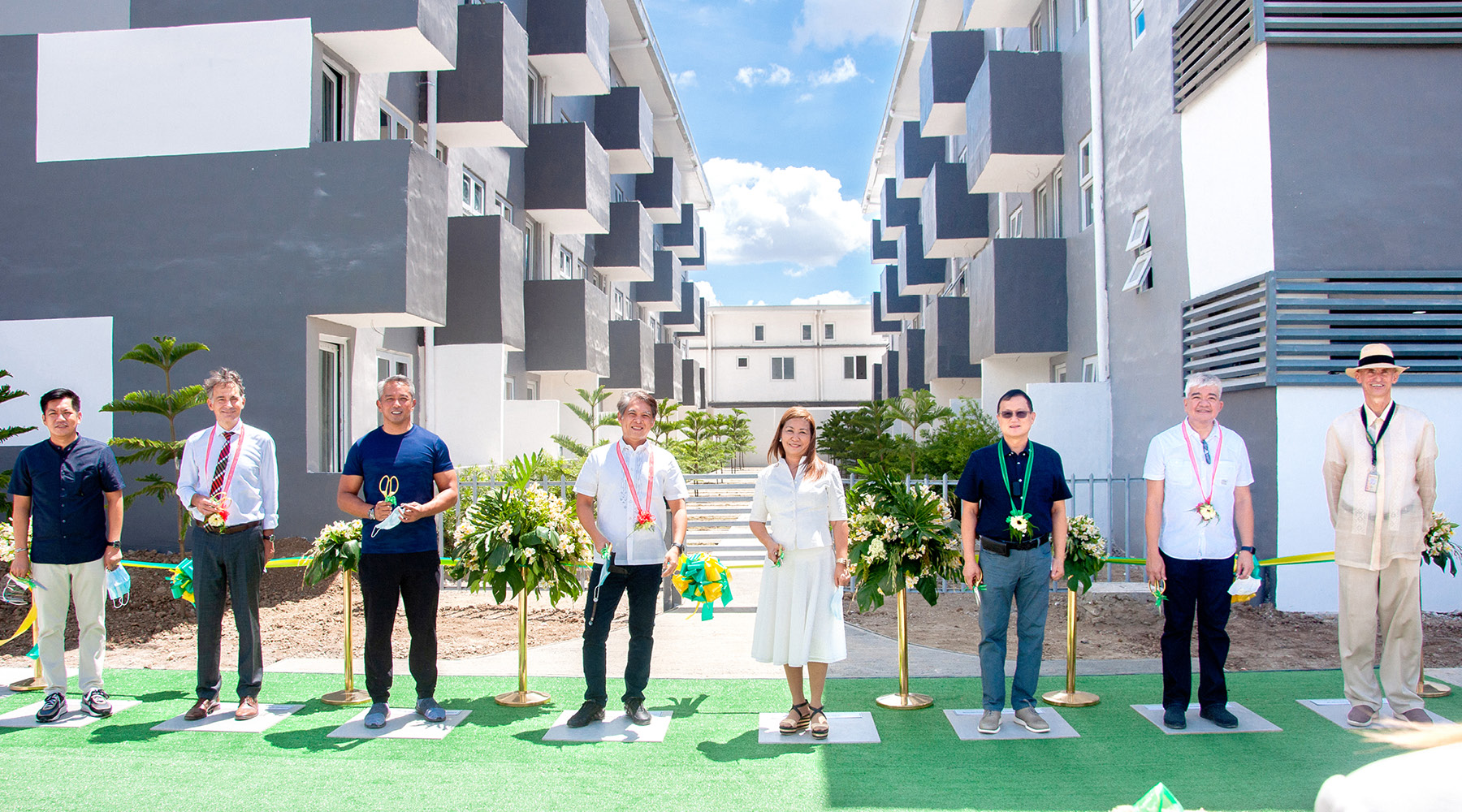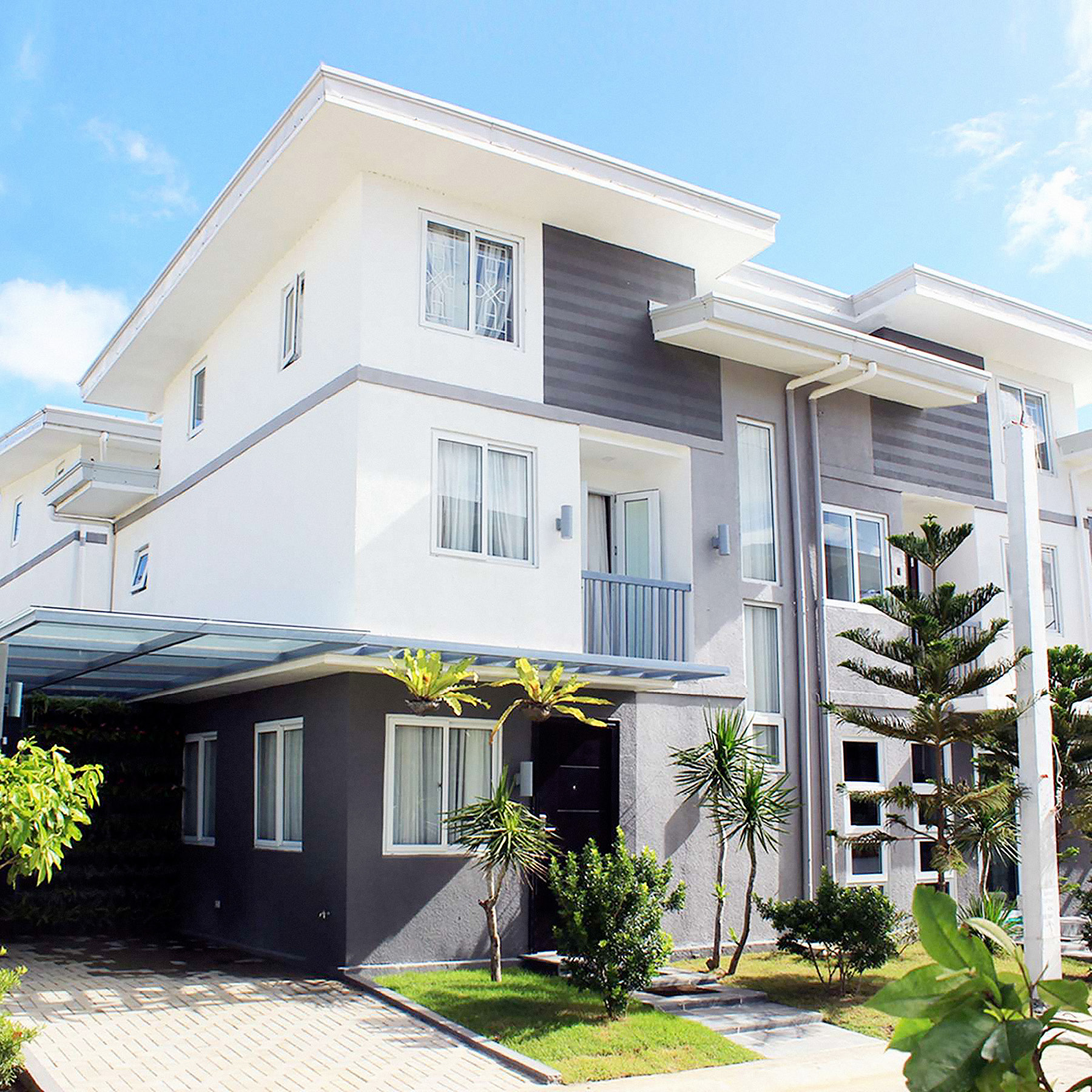Before the heavy clouds of the rainy season began to gather to the north of Luzon in the Philippines in early 2023, around 35,000 bagged giant bamboo propagules were carefully prepared for planting by members of the Dumagat tribes.
In this mountainous region, water supply has long been a contentious issue, which is why these young bamboo plants held special promise for these tribespeople, who committed 1,800 hectares of their ancestral domain toward the project.
Donated by real estate development company DDC Land, the bamboo was selected for its ability to regulate atmospheric temperature, retain water and mitigate soil erosion, helping to safeguard the future of the ecosystems it lives within.
By sequestering substantial amounts of carbon dioxide from the atmosphere, the plant can also help slow the rate of global warming.

“I think water is definitely becoming a very critical issue in our daily lives.”
It’s an issue that is climbing the global agenda as climate change turns up the heat around the world, and DDC Land CEO Edna Sutter, who co-founded the company with her husband, Martin, is determined to be part of the solution.
“We are very proud that DDC Land is addressing this, and also helping the world when it comes to mitigating the adverse effects of climate change,” she tells The CEO Magazine.
In February 2022, the company partnered with RUBLOU and Kaksaan, a group of Dumagats elders and tribal chieftains, to establish the Bamboo Initiative for Growth Philippines, fondly known as BIG PH.
It is DDC Land’s flagship CSR project, which is being administered by the Sutters to create giant bamboo forests in a variety of locations across the Philippines, which will work to counter the effects of climate change and generate livelihood programs.
Last year, DDC Land distributed more than 120,000 giant bamboo propagules in different areas, tackling a number of pressing environmental issues, including water supply.
“We’re concerned about the water table,” Sutter says, referring to the boundary between the unsaturated zone of the soil surface and the saturated zone underground.
“The water table is really moving deeper and deeper. We know that because when we develop villages and subdivisions, we have to provide water. And I think water is definitely becoming a very critical issue in our daily lives.”
Integrity Inbuilt
It represents one of many inspiring chapters in the story of DDC Land, which was first established in 1991 as a dry docking business.
In 1996, it pivoted to real estate development, and over the three decades since, it has become a leader in its field, while keeping sustainability firmly at the heart of its business model.
This conscientiousness extends well beyond DDC Land’s CSR initiatives, underpinning the way it does business as well as its approach to development. As Sutter explains, the company takes a phased approach to real estate.
Bamboo Fast Facts
Bamboo is the fastest-growing land plant on the planet.
With a tensile strength of 12,700 kilograms per square centimeter, bamboo is an exceptionally strong building material.
A grove of bamboo releases 35 percent more oxygen than an equivalent number of trees.
Bamboo cools down the surrounding air by up to eight degrees Celsius in summer, acting as natural air conditioning.
Its rapid growth, permanent canopy and vast root network make bamboo a great tool for soil protection.
For example, when the company first started work on its Santa Rosa Garden Villas development more than a decade ago, the project was set across seven hectares. Wind the clock forward and its area has now expanded by more than 10 times to 80 hectares.
The themed community features several flower gardens and an in-built commercial area, the Garden Plaza Mall, as well as several basketball courts, a clubhouse and spacious roads designed specifically to better serve the community.
“We prefer to grow a community from small to large,” Sutter says. “We do it in phases until it becomes a township community with commercial buildings and other services.”
Indeed, it has become known for its signature township development concept, through which DDC Land builds a complex of cost-efficient housing, which is both durable and aesthetically pleasing, creating a dream community for Filipinos.
Expanding to other geographical locations is also on the cards, but Sutter is determined that the company does it in a similarly measured manner.
“We would like to expand in other geographical locations, and we would like also to conduct deeper analysis and understanding of the needs and demands of markets in the new location,” she says.
Crafting Solutions
As the real estate market in the Philippines and around the world continues to feel the impact of the COVID-19 pandemic, Sutter emphasizes that the priority is damage control.
Even amid the pandemic’s upheaval, DDC Land harnessed its successful approach to inaugurate Tanza Garden Heights, a condominium development in Tanza in the province of Cavite, south of Manila.
Sutter believes that the strength of the company’s supply chain enabled it to advance even through this tumultuous period.
“Efficient supply chain management ensures that all products and services are delivered to customers, so we need the support of our suppliers,” she says. “We also believe that an efficient supply chain and operations management lead to cost deductions.”

“We want to deal with people who are on the same wavelength as us, especially when it comes to reducing their negative environmental impact.”
Collaboration is crucial to all of this, with the key to productive relationships in ensuring that suppliers have a similar commitment.
“We have to have effective partnerships, information sharing, innovation and, of course, include overall performance,” Sutter says.
“We want to deal with people who are on the same wavelength as us, especially when it comes to reducing their negative environmental impact.”
To this end, DDC Land works closely with innovative companies that are helping to drive change with their environmentally friendly building methods and materials. As an example, Sutter highlights the suppliers of the cutting-edge ecocast bricks and E-Z blocks used in the construction of Tanza Garden Heights.
“The blocks we use are composed of ground plastic bottles,” she explains.
Ten of the buildings in its Tanza Garden Heights development involved the reuse of 26 million plastic bottles and sachets that would otherwise have ended up in the waterways.
“We also use another kind of sustainable block, which can reduce the intrusion of heat inside the house, thereby minimizing or reducing the use of air conditioners in homes,” she says.
DDC Land’s sustainable practices actually go even further, with Sutter highlighting another of the company’s vows.
“To optimize transportation loads, we have to reduce our energy consumption and we have to ensure we are ethical,” she says.
It’s a sense of responsibility that doesn’t end with the sale of a property. Rather, it encourages residents of its communities to continue this work by employing sustainable practices in their day-to-day lives.
At The Garden Villas, it has installed a power system that supplies cleaner electricity to each unit, thereby driving down energy consumption, and has planted Araucaria and Maki plants along the building perimeters and other green areas to help reduce the ‘heat urban island effect’ and enhance site sustainability.
The integration of Material Recovery Facilities software has also enabled DDC Land to build a solid waste management system for proper waste disposal.
Future Thinking
It is an ability to constantly seek out fresh ways of both working and living that gives Sutter her unique edge. Drawing heavily on her engineering background, her eyes are constantly on the latest trends and the most innovative technology.
Exploring promising new business opportunities is also one of her strengths. In our conversation, she identifies rentals and vacation rentals as areas well worth entering, along with senior housing.
“A lot of foreigners from Taiwan and Singapore who are retired would like to settle in the Philippines, and I think that’s a good prospect,” she says.
Building on its customer offering is also on the cards, through collaboration with other innovative businesses. This will prove critical in terms of customer retention, in Sutter’s view.
Its sales structure is another vital point that sets DDC Land apart from the competition, eliminating the need for middlemen, Sutter adds.

“We’re doing business to elevate the living standards of people.”
“We had been benefiting so much from clients who were referred to us; we actually don’t have many dealings with real estate brokers. We employ our salaried salespeople and really maximize the benefit for the customer,” she says.
With so many of its sales activities done in-house, its people are undoubtedly DDC Land’s greatest asset. The company now has a workforce of around 200 key people based in its Pasay City office, and Sutter is constantly thinking of dynamic ways to keep them engaged.
“We intend to invest in and retain our top talents by perhaps improving compensation packages and, of course, providing further career development opportunities,” she says.
Sutter is proud to have created a culture of inclusion, uplifting the lives of those who work for her. While DDC Land has invested in automation systems that drive down costs and boost efficiencies, she insists that creating opportunities for workers is still a much greater priority.
“Our people, who really need help from us, are given equal access to opportunities and assistance,” she says. “We’re doing business to really try to elevate the living standards of those people.”
A Worthy Goal
This social responsibility is at the heart of everything DDC Land does, with the company’s mission set out as ‘Building homes for life’. What this means, Sutter explains, is ensuring everyone has access to a house they can call their own – a dream for many Filipinos who see owning a home as the route to a better life.
Affordability is an integral part of the company’s mandate, which in no way means compromising on quality. DDC Land has consistently garnered a plethora of awards, among them Most Outstanding and Trusted Housing Developer – National Level and Hall of Fame Awardee for Best Low-Cost Provider.
More than that, in Sutter’s book, it’s not enough to simply adhere to consumer expectations of quality. She hopes to set a new benchmark, lifting quality across the sector and creating growth opportunities for all stakeholders in the process.
“As corporations, we should try to inculcate in our minds that we exist to help people and to contribute to society.”
Another pillar of its mission is set out as providing “opportunities of excellence, conscientious leadership and accountability within our work for our customers and stakeholders”. With this perspective, it is clear that truthfulness in business dealings is paramount for Sutter.
“As corporations, we should try to inculcate in our minds that corporations exist to help people and to contribute to society. That should be the main reason why business corporations exist,” she insists.
“We have taken so much already from Mother Nature; I think we have a moral responsibility to our future generations. We have already benefited so much from luxuries offered by the fossil fuel industries.
“Our future generations have the right to exist and to enjoy what we have enjoyed.”




